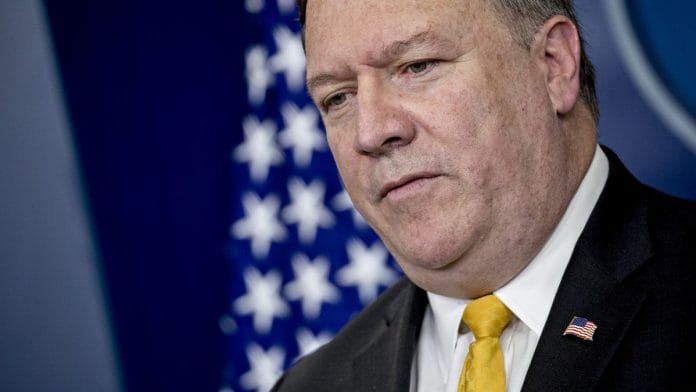In the 17-year conflict in Afghanistan, American officials have often accused Pakistan of supporting militant groups that undermine the war effort.
Karachi: The US and Pakistan both said they are pushing to “reset” a fraught relationship that saw the Trump administration cut security funding, citing a lack of progress in clamping down on terrorist groups operating in Afghanistan.
Secretary of State Michael Pompeo arrived in Pakistan on Wednesday for meetings with senior Pakistani officials including Prime Minister Imran Khan, whose party won an election in July. Ahead of his arrival in Islamabad, Pompeo said he wanted to “reset” relations even as he repeated calls for Pakistan to fight militant groups that operate in neighbouring Afghanistan.
“Various issues to deal with, but I think we are getting there,” Khan said. “The first three months — we always knew the first three months were going to be tough. But we are on top of it.”
After the meeting, Pompeo told reporters they spoke about how to improve relations, boost economic ties and find a solution in Afghanistan that benefits all sides.
“I’m hopeful that the foundation that we laid today will set the conditions for continued success as we start to move forward,” Pompeo said.
The US and Pakistan have had a tense relationship throughout the 17-year conflict in Afghanistan. While Pakistan serves as a key supply route for US forces operating in Afghanistan, American officials have repeatedly accused officials in Islamabad of supporting militant groups that undermine the war effort.
Pakistan has allegedly long maintained ties with the Taliban as a way to prevent the government in Kabul from getting too close with arch-rival India. Khan in particular views the US presence in the region as the main cause of instability, and has called for talks with militants in border areas who have led an insurgency that has killed tens of thousands of Pakistanis since 2001.
Pakistan Foreign Minister Shah Mahmood Qureshi, who also met with Pompeo, “underscores the need to reset bilateral ties on basis of mutual trust and respect,” spokesman Mohammad Faisal said on Twitter. “Safeguarding Pakistan’s national interests will remain supreme priority.”
Not Enough
After leaving Washington en route to Islamabad on Tuesday, Pompeo told reporters that Pakistan still hasn’t done enough against terror groups to merit the resumption of US security assistance.
“We certainly haven’t seen the progress that we would have hoped to have seen,” Pompeo told reporters on his plane. “Certainly not progress that would be sufficient for us to have advocated for turning back on that financial support.”
Pompeo and Joint Chiefs of Staff Chairman Joseph Dunford met with Khan and other top leaders on Wednesday before the secretary of state headed to India for talks with that country’s leaders alongside Defense Secretary Jim Mattis.
The US State Department announced in January that it was suspending security assistance to Pakistan as part of President Donald Trump’s effort to escalate pressure on the government to prevent terrorist groups from finding safe harbour in the country. On Sunday, shortly before Pompeo left on his trip, the US Defense Department said it was suspending $300 million in funding to Pakistan over its failure to take action against terror groups.
Biggest Victims
Pakistani officials — who say their own citizens and soldiers have been the biggest victims of terrorism — were angered by a State Department readout of a call Pompeo had with Khan last month. In that conversation, Pompeo “raised the importance of Pakistan taking decisive action against all terrorists operating in Pakistan,” according to the US readout. Officials in Pakistan said the issue wasn’t discussed.
En route from Washington, Pompeo said the US wanted to make clear its expectations of Pakistan to the new government, adding that the decision by the Defense Department wasn’t a surprise.
“Look, this wasn’t news to the Pakistanis,’’ Pompeo said. “The rationale for them not getting the money is very clear, it’s that we haven’t seen the progress that we need to see from them and the very reason for this trip is to try to articulate what it is our expectation is. We need Pakistan to seriously engage to help us get to the reconciliation we need in Afghanistan.”
Longest War
Pompeo visited Afghanistan in July and said he was confident the US strategy in that country is working. A year ago, Trump authorized the Pentagon to bolster US forces in what has become America’s longest war. The Taliban — who are widely believed to have close ties to Pakistan’s intelligence service — took part in a brief truce in June but a breakthrough has remained elusive and the group has made steady gains at the government’s expense.
Pompeo was joined on the plane by Zalmay Khalilzad, his new special envoy for Afghanistan reconciliation, as Washington looks to clear the way for talks between Afghanistan President Ashraf Ghani’s government and Taliban leaders. Khalilzad is a former US ambassador to Afghanistan, Iraq and the United Nations. –Bloomberg






